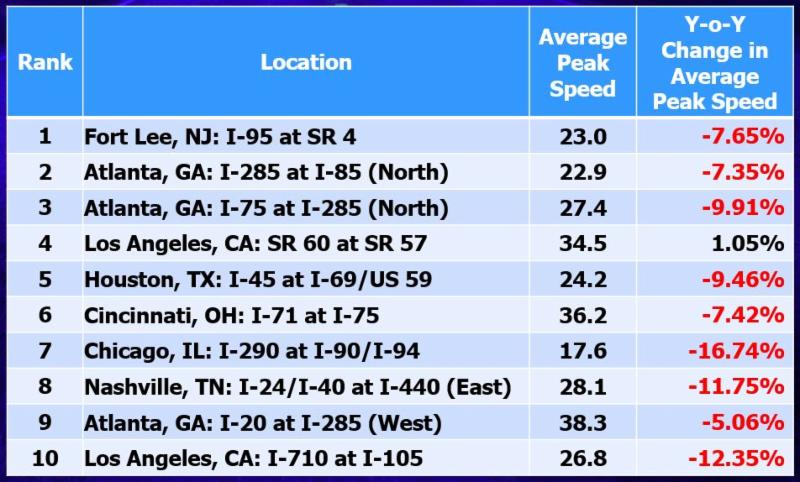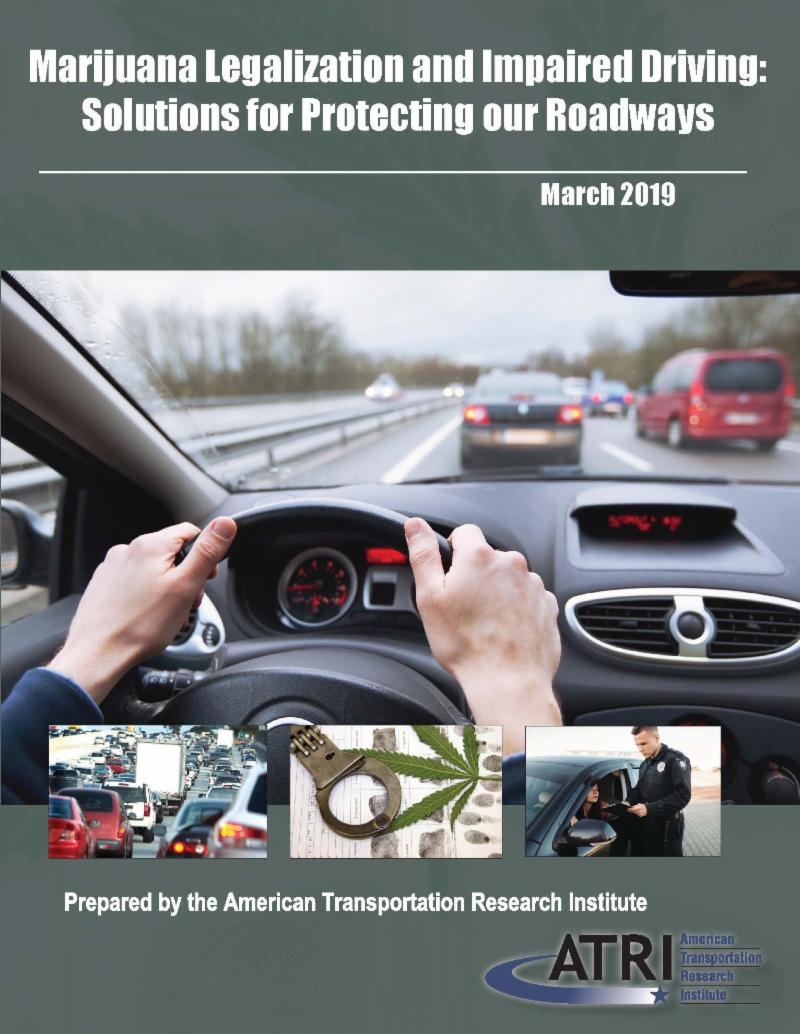
ATRI's Dan Murray Promoted to Senior Vice President
ATRI's Dan Murray has been promoted to Senior Vice President. Murray has been with ATRI since 1994 and most recently served as ATRI's Vice President.
"Dan's contributions to ATRI's success over the years are immeasurable and this promotion is a fitting reflection of his leadership in all areas of our work on behalf of the trucking industry," said ATRI President Rebecca Brewster in announcing the promotion.
As Senior Vice President, Murray will continue to lead ATRI's portfolio of sponsored research as well as provide strategic direction and management of ATRI's top research priorities.
Murray is based in ATRI's Minnesota office.
|
HELP SUPPORT ATRI'S RESEARCH
|
Board of Directors
Ms. Judy McReynolds
ATRI Chair
Chairman, President and CEO
ArcBest Corporation
Mr. Andrew Boyle
Co-President
Boyle Transportation
Mr. Rich Freeland
President and COO
Cummins Inc.
Mr. Darren Hawkins
Chief Executive Officer
YRC Worldwide
Mr. Dave Huneryager
President and CEO
Tennessee Trucking
Association
Mr. Derek J. Leathers
President and CEO
Werner Enterprises
Mr. Robert E. Low
President and CEO
Prime Inc.
Mr. Rich McArdle
President
UPS Freight
Mr. Benjamin J. McLean
Chief Executive Officer
Ruan Transportation
Management Systems
Mr. Dennis Nash
Executive Chairman of the Board
Kenan Advantage Group
Mr. Clifton Parker
President and General Manager
G&P Trucking Company, Inc.
Mr. James D. Reed
President and CEO
USA Truck
Ms. Annette Sandberg
President and CEO
Transsafe Consulting, LLC
Mr. John A. Smith
President and CEO
FedEx Freight
Ms. Rebecca M. Brewster
President and COO
American Transportation
Research Institute
Mr. Chris Spear
President and CEO
American Trucking Associations
|
ATRI Appearances and Presentations
|
July 20, SiriusXM Channel 146 Women in Trucking Radio Show, 12:00 p.m. ET, Rebecca Brewster
July 22-23, National Association of College and University Mail Services Educational Conference, Orlando, FL, Jeffrey Short
August 1-2, Louisiana Motor Trucking Association Annual Conference, Destin, FL, Rebecca Brewster
August 7-9, Iowa Motor Trucking Association Lead Conference, Des Moines, IA, Rebecca Brewster
August 8, SiriusXM Channel 146 ATRI on the Air - Dave Nemo, 9:00 a.m. ET,
Dan Murray
August 13, IFTA Annual Business Meeting, Raleigh, NC, Rebecca Brewster
August 22-23, FedEx Institute, Memphis, TN,
Dan Murray
August 26, SiriusXM Channel 146 Road Dog Trucking with Mark Willis, 2:00 p.m. ET, Rebecca Brewster
September 5,
2019 Transportation Factoring Meeting, Austin, TX, Dan Murray
September 10-12, National Highway Transportation Safety Administration Conference, Denver, CO,
Dan Murray
September 12, SiriusXM Channel 146 ATRI on the Air -Dave Nemo, 9:00 a.m. ET, Rebecca Brewster
September 25, Oklahoma Trucking Association Annual Conference, Tulsa, OK, Rebecca Brewster
October 1, NCTA Councils Annual Conference and Expo, Wilmington, NC,
Rebecca Brewster
October 10, SiriusXM Channel 146 ATRI on the Air - Dave Nemo, 9:00 a.m. ET, Dan Murray
October 23-24, Assured Partners Transportation Insurance, Orlando, FL, Rebecca Brewster
October 31, North American Commercial Vehicle Show, Atlanta, GA,
Rebecca Brewster
November 14, SiriusXM Channel 146 ATRI on the Air - Dave Nemo, 9:00 a.m. ET, Rebecca Brewster
November 19-20, 2019 UMASS 2019 Commercial Vehicle Safety Summit, Northhampton, MA,
Rebecca Brewster
|
 |
|
|
|
|
The Nation's Worst Truck Bottlenecks
For nearly a decade now, ATRI has been monitoring truck congestion at some of the nation's worst chokepoints. ATRI's annual Top Truck Bottleneck List assesses the level of truck-oriented congestion at 300 locations on the national highway system. The analysis, based on truck GPS data from nearly 1 million heavy duty trucks, uses several customized software applications and analysis methods, along with terabytes of data from trucking operations to produce a congestion impact ranking for each location. ATRI's truck GPS data is used to support the USDOT's freight mobility initiatives.
The 2019 Top Truck Bottleneck List saw a return to the number one spot by Fort Lee, New Jersey, where I-95 and SR 4 intersect. Trucks at the Fort Lee location saw average rush hour speeds of 23 mph. The previous #1 location, I-285 at I-85 North in Atlanta dropped to #2 on the 2019 list. Atlanta had three spots in the top 10 on this year's list.

ATRI's analysis found that year-over-year truck speeds across the top 10 locations dropped by an average of nearly 9 percent as congestion worsened along the nation's busiest freight roadways.
"ATRI's research shows us where the worst pain points are - but they are far from the only ones. This report should be a wakeup call for elected leaders at all levels of government that we must act quickly to address our increasingly congested highway system," ATA President and CEO Chris Spear said. "Without meaningful investment in our nation's infrastructure, carriers will continue to endure billions of dollars in congestion-related costs - which results in a self-inflicted drag on our economy."
For access to the full report, including detailed information on each of the 100 top congested locations, please visit ATRI's website
here
.
|
Quantifying the Impact of Congestion on Fuel Consumption and Emissions
ATRI recently released a case study that quantifies how improvements to our nation's highway infrastructure can help conserve fuel and reduce emissions. Nationally, congestion is estimated to have increased the trucking industry's fuel consumption by 6.87 billion gallons in 2016; adding an additional $15.74 billion to its fuel bill.
In this analysis, ATRI estimated the fuel consumption and emissions impacts of congestion at one of the worst traffic bottlenecks in the country, the interchange of I-285 and I-85 in Atlanta, Georgia; known locally as Spaghetti Junction. The research combined ATRI's unique truck GPS database to determine vehicle speeds by time of day, daily trip counts collected by the Georgia Department of Transportation, and emissions factors derived from the U.S. EPA's state-of-the-science emissions model.
The study found that increasing average vehicle speeds to 55 mph, which currently are as low as 14 mph during the weekday evening commute, is projected to save 4.5 million gallons of fuel annually - savings which benefit both local commuters and trucking companies. Beyond fuel savings, reductions in emissions were estimated to be 17 percent for fine particulate matter, 5.5 percent for smog-forming NOx emissions and 8 percent for carbon dioxide emissions.
"Fleets today consider not only their bottom line but also their environmental performance," said Mack Guest, president of LAD Truck Lines. "This case study highlights how investing in our nation's infrastructure can serve the dual purpose of lowering transportation costs and air pollution."
The report is the second case study ATRI has published as part of its "Fixing the 12%" research initiative. ATRI previously found that 89 percent of the trucking industry's congestion costs are generated from just 12 percent of Interstate miles. Improving that 12 percent could positively impact the flow of people and goods as well as the environment.
You can download a copy of this report
here
.
|
The Trucking Industry's Top Research Priorities
Earlier this year, ATRI's Research Advisory Committee (RAC) identified six priority research topics for 2019, which were subsequently approved by ATRI's Board of Directors. At its meeting held in March, RAC members reviewed over 25 different research proposals before narrowing the topics to the top six most critical studies.
 |
|
 |
At its meeting held in March, RAC members reviewed over 25 different research proposals before narrowing the topics to the top six most critical studies.
|
This year's approved topics cover a wide array of critical industry issues including truck parking, younger driver safety, the return-on-investment of new truck safety technologies, and the impact of "nuclear" verdicts on the trucking industry.
ATRI's 2019 top research priorities are:
- Standardizing Truck Parking Information Systems - developing ideal truck parking data formats and standards based on truck driver preferences.
- Rethinking Mileage-Based Safety Metrics - given the growth in E-commerce and other changing industry trends which have changed trip lengths and route locations, examining the potential for new metrics to evaluate safety performance beyond traditional rates per million vehicle miles traveled.
- Analyzing Younger Driver Safety in Intrastate Driving - quantifying the safety performance of 18-20 year old truck drivers who are currently driving in intrastate operations versus experienced interstate commercial drivers.
- Revising the ROI of Truck Safety Technologies - updating cost-benefit analyses that ATRI originally conducted for FMCSA on several more advanced safety technologies being deployed today.
- Impact of "Nuclear" Verdicts on Trucking - documenting and quantifying historical trends associated with growing jury awards and out-of-court settlements.
- Tolls: Who Pays and Where Does the Money Go? - updating ATRI's previous infrastructure analyses to focus on tolls; comparative analysis of toll revenue reinvestment in roads versus administration, and the equity of toll formulas for cars and trucks.
ATRI kicked off its data collection for the Truck Parking Information Systems research through a driver survey at the Mid-America Trucking Show where over 350 professional drivers completed the survey. ATRI has also initiated work on the studies on nuclear verdicts and tolls and will be releasing findings from these studies later in 2019.
|
New Study Identifies Key Actions for Keeping Roadways
Safe From Marijuana-Impaired Car Drivers

One of ATRI's newest releases examines the impact that marijuana-impaired car drivers have on highway safety, a top research priority identified by ATRI's Research Advisory Committee (RAC) in 2018. With more states legalizing both recreational and medical marijuana, professional truck drivers are more likely to be sharing the roadway with car drivers operating under the influence of marijuana.
ATRI's study sought to document the most promising methods to identify and deter marijuana-impaired driving. Among the recommendations generating from the research: increased data collection on the frequency and impacts of marijuana-impaired driving; public education and information on the risks of impaired driving; better equipping law enforcement and the court system to intercept and ultimately prosecute impaired drivers; and targeting tax revenue generated from marijuana sales to fund these activities.
"It is extremely concerning to motor carriers and our drivers that recreational marijuana is legal in so many states, yet as the ATRI report documents, a valid and widely accepted breathalyzer-type test is not available to law enforcement," said Mike Card, Combined Transport, Inc. President. "ATRI's study clearly defines a role for federal and state leaders to support law enforcement and others in keeping the roadways safe from those who choose to drive high."
In particular, the report highlights the importance of training law enforcement to identify and collect evidence of marijuana-impaired driving, particularly through the development of more drug recognition experts (DREs).
"As ATRI's research identifies, a key tool for combating drugged drivers is deploying additional drug recognition experts," said Mark Savage, Deputy Chief of the Colorado State Patrol. "A DRE can bring critical evidence to prosecutors that other tests simply cannot measure."
You can download a copy of the research on ATRI's website
here
.
|
Industry Leaders Appointed to ATRI Board of Directors
In May, the ATRI Board of Directors welcomed two new members as appointed by ATRI Chair Judy McReynolds,
ArcBest Corporation Chairman, President and CEO:
- Clifton Parker, G&P Trucking Company, Inc. President and General Manager, Gaston, South Carolina;
- John A. Smith, FedEx Freight President and Chief Executive Officer, Memphis, Tennessee.
Mr. Parker has served as President and General Manager of G&P Trucking Company since 1986. During his tenure at G&P, the company has grown from $5 million to sales of over $150 million in 2017. He has been active in the South Carolina Trucking Association where he served as Chairman for two years, and currently serves as SCTA's representative to the American Trucking Associations. He has been recognized by the South Carolina House for Outstanding Leadership in the field of transportation and appointed to a study committee on Public Private Partnerships in Transportation to make recommendations to the Governor. He has a B.A. from the University of North Carolina-Charlotte.
Mr. Smith has 32 years of experience in the transportation industry. He has been with FedEx since 2000 where he currently provides strategic direction for the less-than-truckload (LTL) FedEx companies throughout North America. He also serves on the Strategic Management Committee of FedEx Corp., which sets the strategic direction for the FedEx enterprise. His experience spans every area of the business, including operations, sales, transportation, fleet maintenance, facility services and safety. John currently serves on the boards of the Arkansas Trucking Association and the Automotive Service Excellence Education Foundation. He is a graduate of Northwestern State University with a degree in geology.
"Our board plays a critical role in guiding and shaping ATRI's research priorities," said ATRI President and COO Rebecca Brewster. "We are fortunate to have a very engaged Board of Directors and look forward to working with Clifton and John."
|
New Research from ATRI Identifies E-Commerce Impacts on the Trucking Industry
In a new study, ATRI looks at the impacts that emerging e-commerce trends are having on the trucking
industry,
including the challenges and opportunities that more regionalized retail supply chains and the proliferation of urban "last mile" deliveries have presented. This research was identified as a top research priority by ATRI's Research Advisory Committee.
The analysis provides background on emerging e-commerce and omni-channel retailing trends, and maps the implications of these trends to trucking operations and the industry's top ten issues. Key findings in ATRI's report include:
- From 1999-2017, e-commerce sales increased from less than one percent of total U.S. retail sales to more than nine percent, reflecting a 3,000 percent increase in e -commerce sales.
- Annual growth of e-commerce has ranged between 13 and 16 percent over the last five years, outpacing the one to five percent annual growth in traditional retail sales.
- Retailers are becoming more flexible in how they transact with consumers by decentralizing their distribution/fulfillment networks to bring inventory closer to consumers.
- There were 2,130 fewer department stores and 385,000 fewer jobs at these stores in 2017 compared to 2015; there were 1,937 more courier services operating and just over 85,000 new employees hired in the sector during this time period.
- "Last Mile Fulfillment Centers" represented 73 percent of the industrial real estate market in 2017, a 15 percentage point increase from the previous year.
- Registrations for single-unit trucks increased by 7.8 percent between 2007 and 2016 compared to 4.4 percent growth in combination truck registrations.
- The number of intra-regional and last-mile truck trips has increased while the average length of haul has declined. Average trip lengths have decreased 37 percent since 2000, while urban vehicle miles traveled have increased for much of this time period.
- Intrastate and local hauls for e-commerce could serve as a training opportunity for 18-20-year-old drivers, representing a huge new pool of potential interstate CDL drivers.
You can download a copy of the research on ATRI's website here.
|
|
In April ATRI Chair Judy McReynolds received the 2019 Distinguished Woman in Logistics Award established to promote the achievements of women employed in the North American transportation industry. Image: Facebook/ArcBest
|
|
|
ATRI President Rebecca Brewster (center) with Candi Coate (right) and Barbara Herman (left) of K-Limited Carriers at the Great WestTrucking Leadership Symposium in Indianapolis. Congratulations to Barbara for being named the NTTC Professional Tank Truck Driver of the Year Grand Champion.
|
|
|
|
 |
|
ATRI Senior Research Associate Jeff Short, opens the Illinois Trucking Association Safety and Maintenance Conference with the latest ATRI reseach findings.
|
 |
|
|
|
|
ATRI Senior Vice President Dan Murray (right) participating in a panel at the NATSO annual convention in February along with NATSO CEO Lisa Mullings, TTNews Associate News Editor, Dan Ronan and President of TCW, Inc., Dave Manning.
|
|
|
|
|
ATRI Research Assistant Carla Rose (center) joins America Road Team Captain Steve Fields (left) to talk trucking research with Road Dog Trucking's Mark Willis (right) at MATS 2019.
|
|
|
|
Drivers line up at the ATRI booth during MATS 2019 to take part in ATRI's survey on truck parking
.
|
|
|
2019 - 2020 Research Advisory Committee
|
Ms. Karen Rasmussen, RAC Chairman
CEO
HELP, Inc.
Mr. Tom Balzer
President and CEO
Ohio Trucking Association
Mr. Shawn Brown
Vice President, Safety and Recruiting
Cargo Transporters
Mr. Kenneth Calhoun
Fleet Optimization Manager
Altec Service Group
Dr. Alison Conway
Associate Professor, Civil Engineering
City College of New York
Mr. Bob Costello
Chief Economist and Senior Vice President
American Trucking Associations
Mr. Tom Cuthbertson
Vice President, Regulatory Compliance
Omnitracs
Mr. Dan Drella
Director, Safety and Training
Schneider National
Mr. Thomas Fansler
President
Trimble Transportation Mobility
Mr. Jim Fields
Chief Operating Officer
Pitt Ohio
Ms. Victoria King
Vice President Public Affairs
UPS
|
Mr. Stephen Laskowski
President
Canadian Trucking Alliance
Mr. Don Lefeve
President and CEO
Commercial Vehicle Training Association
Mr. Kevin Lhotak
President
Reliable Transportation Specialists
Mr. Mike Ludwick
Chief Administrative Officer
Bison Transport
Mr. Doug Marcello
Transportation Attorney
Marcello and Kivisto
Ms. Jaime Maus
Vice President of Safety and Compliance
Werner Enterprises
Ms. Caroline Mays
Director, Freight and International Trade Section
Texas DOT
Ms. Shannon Newton
President
Arkansas Trucking Association
Mr. Steve Olson
President and Chief Underwriting Officer
Great West Casualty Company
Ms. Holly Pixler
Senior Director Transportation, International and Data Management
MillerCoors
Mr. John Prewitt
President
Tideport Distributing, Inc.
|
Mr. Steve Raetz
Director, Research & Market Intelligence
C.H. Robinson Worldwide, Inc.
Mr. Jeremy Reymer
Founder and CEO
DriverReach
Mr. Lee Sarratt, CDS
Director of Safety
J.B. Hunt
Deputy Chief Mark Savage
Colorado State Patrol
Ms. Kary Schaefer
General Manager of Marketing, Strategy for Freightliner and Detroit Brands
Daimler Trucks North America
Mr. Russell Simpson
America's Road Team Captain
Holland
Mr. Mike Stephens
Vice President of Finance
USA Truck
Mr. Collin Stewart
President and CEO
Stewart Transport
Ms. Sara Walfoort
Manager, Freight Planning
Southwestern Pennsylvania Commission
Mr. Tom Weakley
Director of Operations
Owner-Operator Independent
Drivers Association Foundation
Mr. Shawn Yadon
Chief Executive Officer
California Trucking Association
|
|
|
|
|
|